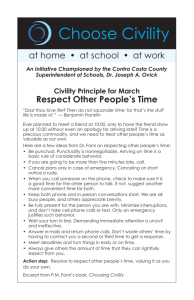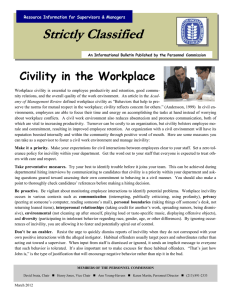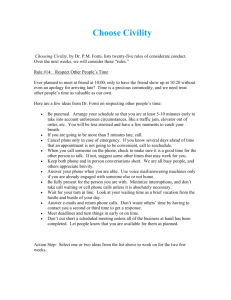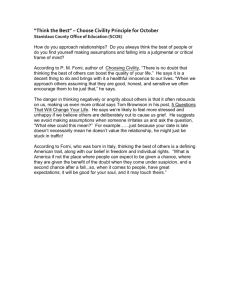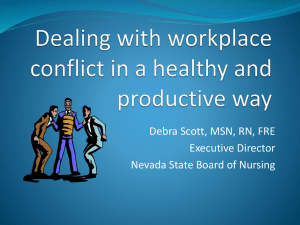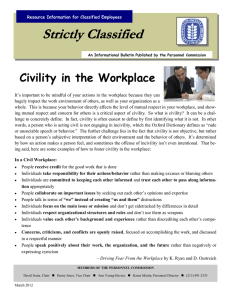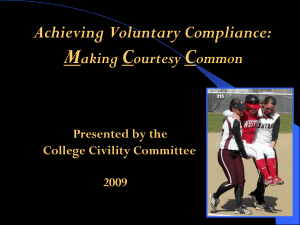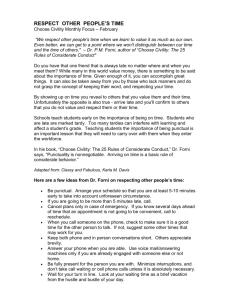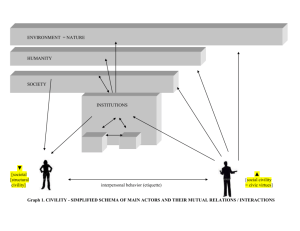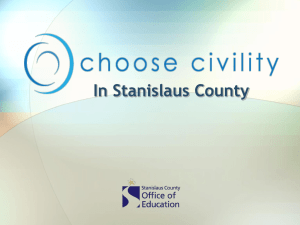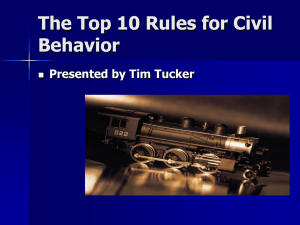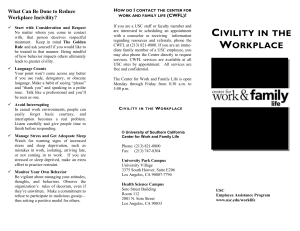4-Civility In the Workplace
advertisement
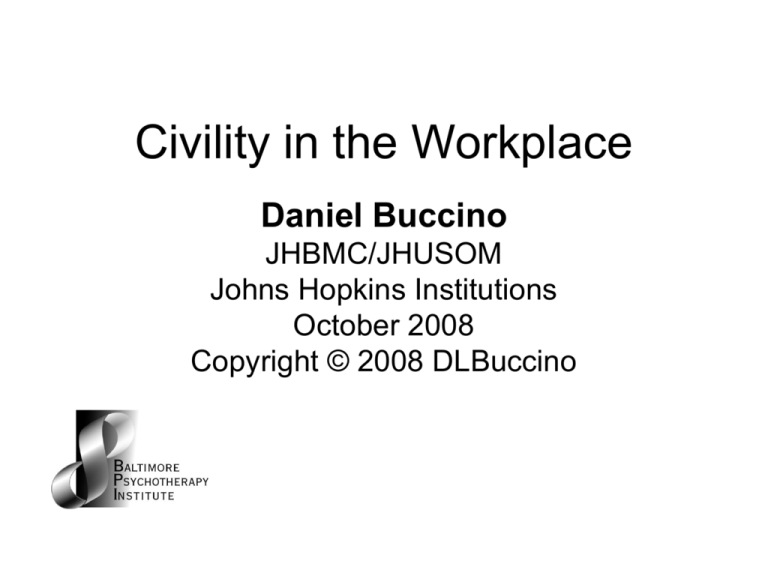
Civility in the Workplace Daniel Buccino JHBMC/JHUSOM Johns Hopkins Institutions October 2008 Copyright © 2008 DLBuccino Defining Civility • Civility is a form of benevolent awareness. Respect Restraint Consideration From PM Forni CIVILITY • • • • • • • Politeness Respect Affirmation Morality Connection Accountability Assertiveness • • • • • • • The Golden Rule Manners Tolerance Self-Restraint Focus Public Health Quality of Life Civility • • • • • “The Good Life”: Relationships Purposeful Poise Relational Competence Expedient and Polite: Good for Business Altruism and Self-Interest: Good for You and Good for Others • The Inner “Designated Driver” • Sprezzatura and Bushido • One Step Beyond the Golden Rule The Science of Civility • “Tend and befriend” just as innate as “fight or flight” • Elicits oxytocin, the hormone of bonding and caring • Nurturing, not self-interest • Connection, not selfishness or aggression -Shelley Taylor, UCLA, The Tending Instinct (2003)(evolutionary biology) One Step Beyond the Golden Rule! • Think first of others’ comfort and convenience. • If not OK for others, don’t insist. • “Presenteeism” is the new “Absenteeism.” • Restrain Yourself! Civility = “Standard Precautions” Civility and the Workplace • Recruitment and retention difficult. • Right skills and right personality traits not easy to find and can be life and death. • Work/life balance critical: Care for employees at all levels so they can best provide patientcentered care. • “It’s the little things that count”: For patients and staff : Communication, care, acknowledgement, courtesy, and service. – Development Dimensions Int’l., HR Consulting US News: Civility Survey • 89% of people interviewed said that it was a serious problem in today’s society. • 90% of those same people said they were not personally rude. • 50% say it is extremely serious. • 78% said civility has deteriorated considerably over the past ten years. • 90% of those polled believe it contributes to the increasing violence in this country. • 85% believe it divides the national community. • 85% believe it contributes to eroding crucial values such as respecting others. The Costs of Workplace Incivility: The Perception of a Decline Public Agenda Study, April 2002 Pew Charitable Trust Funding 79% say lack of courtesy and respect a serious national problem 61% say worsening trend in recent years The Costs of Workplace Incivility: The Perception of a Decline Baltimore Workplace Civility Study 2003 83% very important to work in a civil environment 70% contemplated changing jobs 25% said workplace less civil in the last 12 months 37% decreased effort at work 13% used health care / employee assistance benefits From JHU/UB-JFI Effects of Workplace Incivility Lowered morale of employees Reduced workplace citizenship behaviors (littering, carelessness with handling equipment and facilities, not taking care of others, etc.) Reduced team effectiveness Being uncivil to customers, clients, or others outside the immediate organization, office, or facility http://www.citehr.com/PM Forni The Terrible 10 • 10. Using cell-phones in midconversation or in a meeting (or the bathroom!). • 9. Smoking in non-smoking areas, or near non-smokers without permission. • 8. Misuse of handicapped privileges. • 7. Littering (trash, spitting, pet waste). • 6. Aggressive or bullying children JHU/UB JFI Baltimore Incivility Survey, 2007 The Terrible 10 5. Jokes or remarks that mock race, age, gender, disability, sexual preference, religion. 4. Treating service providers as inferiors. 3. Taking credit for someone else’s work. 2. Road Rage: Dangerous, reckless, aggressive driving. 1. Discrimination in the Workplace. JHU/UB JFI Baltimore Incivility Survey, 2007 Dealing with Difficult Co-Workers People are difficult because they either have too high or too low an opinion of themselves. Suggest you need the person’s help to solve the problem. Try to build the confidence of the difficult person. Choose your battles. Talk to a supervisor or Human Resources if the problem persists. What to Do • • • • • • • • Listen. Don’t react. Focus on facts not feelings. Supervise the work not the person. “Maybe you’re right.” Don’t take it personally. Avoid uncomfortable situations. Civility policies? Dealing with Incivility and Rudeness - Join/Empathize/Turn to Business -Don’t Take it Personally -We Can Only Change Ourselves -Don’t Act Like Them -Take a Time-Out Own the Change “If you don’t like the way things are, and to improve the situation, you have to take the leap and realize that you have to behave yourself with a bit of restraint (and require your children to do so). Everyone cherishes the illusion that you can somehow force someone else and not do it yourself-which would be lovely-but you can’t.” -Miss Manners Diversity in the Workplace DIVERSITY IS A PROCESS -- NOT AN EVENT • Diversity is not the same as Affirmative Action • Diversity includes Everyone • Commitment to diversity means a commitment to all employees Benefits of Diversity 1. Increased awareness will bring greater respect and consideration for all employees. 2. Morale will increase when everyone feels acknowledged, respected, and valued. 3. Employees will feel they truly have equal opportunities for advancement based on competency and experience. 4. Productivity will increase, better results & service will increase sales opportunities; increased revenues will bring more resources and benefits for all employees. Thank You! Questions, comments, concerns? Dan Buccino 410.550.0105 DBuccino@jhmi.edu
